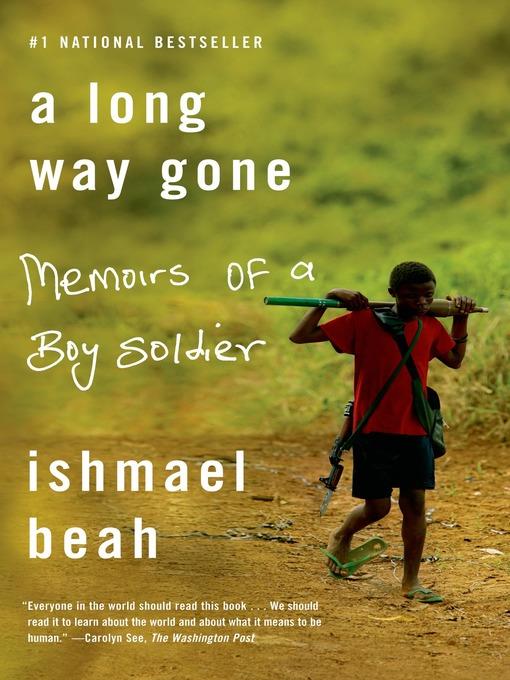
A Long Way Gone
Memoirs of a Boy Soldier
فرمت کتاب
ebook
تاریخ انتشار
2007
Lexile Score
920
Reading Level
4-5
ATOS
6.1
Interest Level
9-12(UG)
نویسنده
Ishmael Beahشابک
9780374706524
کتاب های مرتبط
- اطلاعات
- نقد و بررسی
- دیدگاه کاربران
نقد و بررسی

Starred review from December 18, 2006
This absorbing account by a young man who, as a boy of 12, gets swept up in Sierra Leone's civil war goes beyond even the best journalistic efforts in revealing the life and mind of a child abducted into the horrors of warfare. Beah's harrowing journey transforms him overnight from a child enthralled by American hip-hop music and dance to an internal refugee bereft of family, wandering from village to village in a country grown deeply divided by the indiscriminate atrocities of unruly, sociopathic rebel and army forces. Beah then finds himself in the army—in a drug-filled life of casual mass slaughter that lasts until he is 15, when he's brought to a rehabilitation center sponsored by UNICEF and partnering NGOs. The process marks out Beah as a gifted spokesman for the center's work after his "repatriation" to civilian life in the capital, where he lives with his family and a distant uncle. When the war finally engulfs the capital, it sends 17-year-old Beah fleeing again, this time to the U.S., where he now lives. (Beah graduated from Oberlin College in 2004.) Told in clear, accessible language by a young writer with a gifted literary voice, this memoir seems destined to become a classic firsthand account of war and the ongoing plight of child soldiers in conflicts worldwide.

Starred review from March 1, 2007
Rarely does one encounter anything but outrage, sadness, and pain when reading about the exploitation of child soldiers, but Beah's account also offers hope, humility, bravery, and, yes, peace. Beah was 13 years old when rebels attacked nearby villages in his native Sierra Leone. He was separated from his family (he learned later that they perished) and was on the run from both the rebels and the Sierra Leone Military Forces for over a year. Eventually captured by the military, which could behave as horrendously as the rebels, the boy was forced to join the army, carrying guns or grenade launchers. Like the thousands of other children traumatized by these events, Beah needed rehabilitation when his "tour of duty" was over. A former juvenile center turned counseling house afforded him a safe haven. After being chosen to speak at a UN conference in New York, he began the long process of relocating to the United States. The brutality of war is brought out early in this narrative, and just to have survived is amazing. Beah writes with frankness and honesty about his experiences but also with other people in mind; his account of the healing process after the horrors he saw is remarkable. His book, especially relevant in today's world, should be in all high school, public, and academic libraries. [See Prepub Alert, "LJ" 11/15/06; Beah's book is the second title in the new Starbucks book program.Ed.]James Thorsen, Madison Cty. Schs., Weaverville, NC
Copyright 2007 Library Journal, LLC Used with permission.

April 1, 2007
Adult/High School-This gripping story by a children's-rights advocate recounts his experiences as a boy growing up in Sierra Leone in the 1990s, during one of the most brutal and violent civil wars in recent history. Beah, a boy equally thrilled by causing mischief as by memorizing passages from Shakespeare and dance moves from hip-hop videos, was a typical precocious 12-year-old. But rebel forces destroyed his childhood innocence when they hit his village, driving him to leave his home and travel the arid deserts and jungles of Africa. After several months of struggle, he was recruited by the national army, made a full soldier and learned to shoot an AK-47, and hated everyone who came up against the rebels. The first two thirds of his memoir are frightening: how easy it is for a normal boy to transform into someone as addicted to killing as he is to the cocaine that the army makes readily available. But an abrupt change occurred a few years later when agents from the United Nations pulled him out of the army and placed him in a rehabilitation center. Anger and hate slowly faded away, and readers see the first glimmers of Beah's work as an advocate. Told in a conversational, accessible style, this powerful record of war ends as a beacon to all teens experiencing violence around them by showing them that there are other ways to survive than by adding to the chaos."Matthew L. Moffett, Pohick Regional Library, Burke, VA"
Copyright 2007 School Library Journal, LLC Used with permission.

laurak - This book is basically talking about a 12 year old boy Ishmael from Sierra Leone. Although he's not even a teenager yet, but he as forced to fight a war, held guns and addicted to cocaine and marijuana. The kids are brainwashed that if they join the army, they will revenge for their slaughtered family from war. Ishmael became something he feared the most, a killing machine. I think this story makes me feel really sad, because by looking at the stories of Ishmael, what he saw in the war, and what he had to go through, I feel really bad for him, why does a little boy at this age need to go through this while they didn't even know what they're doing. But after years of wars, Ishmael fell in love with a nurse while he was injured in a conflict, Esther. She opened up a new window for his life. He was invited to give a speech in New York city, and started a new chapter of his life. This book is full of cruelty, but it made me understand that how thankful I should be.

























دیدگاه کاربران